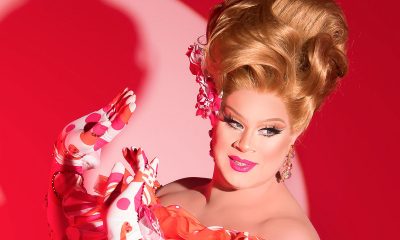a&e features
Pop culture countdown: Iconic and ignominious
A ‘Schock’-ing year for queer pop culture, from holiday rom-coms to COVID disruptions
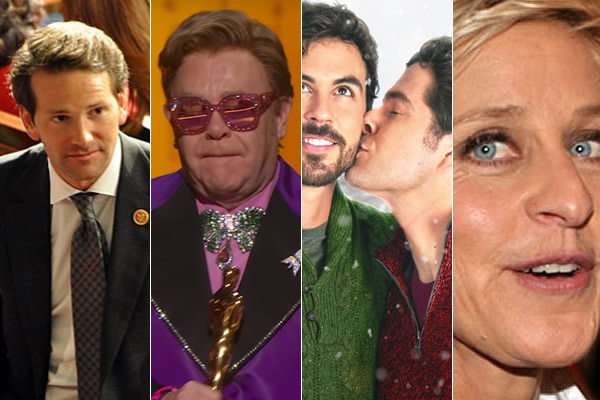
Hollywood was not immune to the COVID-19 pandemic, which caused studios to postpone major releases and to rethink how it does business. Here are the Blade’s top 10 stories in arts and entertainment for 2020.
10: Father knows best
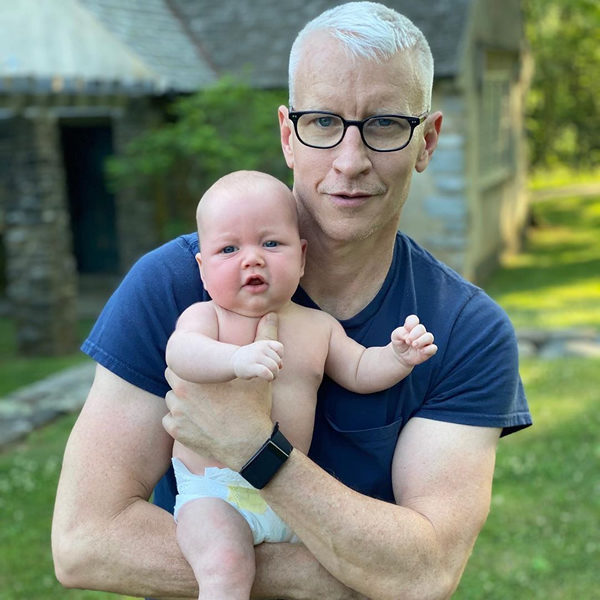
Out CNN anchor Anderson Cooper announced on the air April 30 that his son Wyatt Morgan was born on April 27.
“I am beyond happy,” he told People Magazine.
Cooper, 53, host of CNN’s “Anderson Cooper 360,” named the baby, born via a surrogate, after his father, Wyatt, who died when Cooper was 10 days old. Cooper’s mother was the late Gloria Vanderbilt, who died last year at 95.
Cooper, who finally came out in 2012 after years of speculation, plans to co-raise the baby with his ex, Benjamin Maisani, according to various sources. They broke up in 2018.
9: Pride goes global
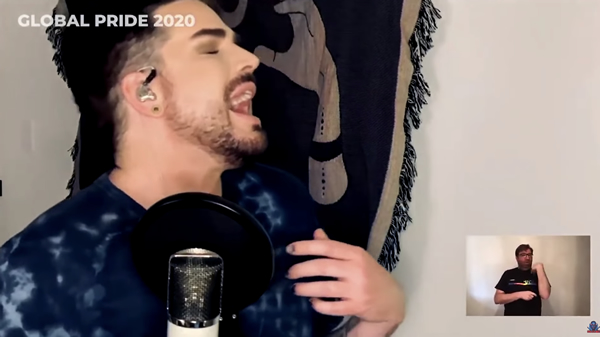
Stymied by COVID-19 restrictions on their usual events, Pride organizers around the world united for Global Pride, an online event on June 27 organized by InterPride and the European Pride Organizers Association.
Performers included Olivia Newton-John, Deborah Cox, Kristine W, Thelma Houston, Steve Grand, the Chicks and more. Manvendra Singh Gohil, a gay Indian prince, was among the speakers.
The theme was “exist, persist, resist” and about 57 million watched the 24-hour virtual event. Todrick Hall hosted. Adam Lambert performed “Mad World.”
8: Hardly Schock-ing
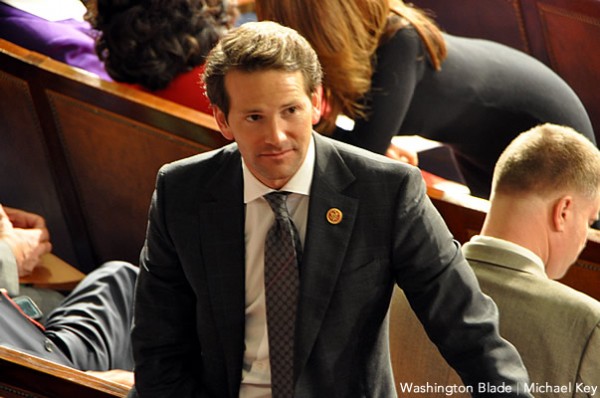
After years of speculation, former U.S. Rep. Aaron Schock (R-Ill.), came out as gay and was not exactly welcomed into the LGBTQ world.
Schock, 39, was elected to Congress at age 27 in 2008 and was once seen as a rising star in the GOP. He resigned in 2015 amid criticism for lavish spending including a redecorating effort of his Capitol Hill office. He was indicted by a federal grand jury in 2016 on 24 counts including wire fraud and theft of government funds but federal prosecutors reached an agreement in 2019 and charges were dropped. Schock vowed to pay back taxes and reimburse his campaign.
Schock, a gym rat almost as famous for his thirsty shirtless pics as his political career, came out in a March 5 blog on his website aschock.net that began simply “I am gay.” He maintains his innocence, said he regrets not coming out sooner but said he assumed his constituents knowing would “not go over well.”
“I also, in retrospect, realize that I was just looking for more excuses to buy time and avoid being the person I’ve always been,” he wrote.
He did not apologize for his anti-gay voting record which included votes against same-sex marriage and the repeal of “Don’t Ask, Don’t Tell.” He had a zero rating from HRC. He did say he’d support LGBT rights “in every way I could” if he were still in Congress.
Reaction was largely negative. Gays as varied as “Queer Eye’s” Jonathan Van Ness to Michelangelo Signorile called him out for hypocrisy.
7: Ho-hum Oscars
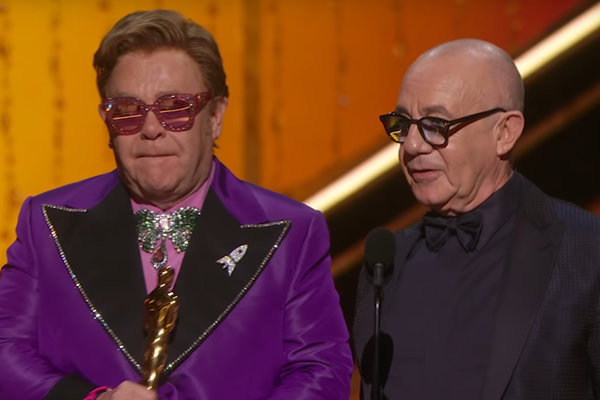
The 92nd Academy Awards were one of the last major events to unfold as usual before COVID restrictions kicked into high gear. Held Feb. 9 in Hollywood, it wasn’t a particularly strong year for LGBT themes. “Parasite” took the top prize and “Joker,” Joaquin Phoenix’s tour de force, had the most nominations. “1917,” “Ford v. Ferrari” and “Once Upon a Time in Hollywood” also won multiple awards.
Of the 20 acting nominees, none were LGBT although two played LGBT characters. “Pain and Glory,” from out director Pedro Almodovar, snagged two nominations.
“If 2019’s record year of inclusion for LGBTQ and LGBTQ-themed nominees was a small step forward … then nominations for Oscar 2020 are a giant lap back,” wrote Blade critic John Paul King.
It was slightly gayer at the ceremony itself. Janelle Monae and Billy Porter performed in the opening. Elton John won Best Original Song with longtime collaborator Bernie Taupin for “(I‘m Gonna) Love Me Again,” from his biopic “Rocketman.”
6: Rom-com representation
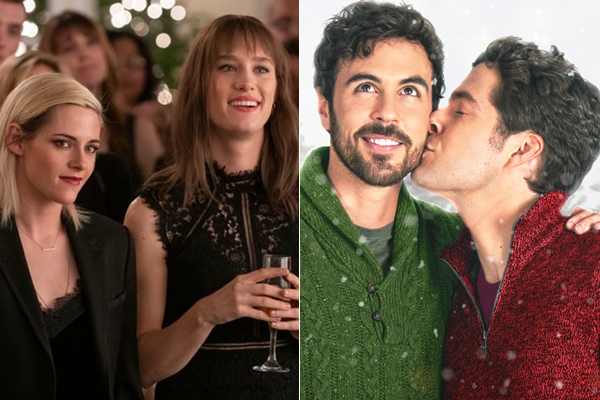
We may have been largely a bust at the Oscars, but in other branches of filmdom, there were major surprises. The New York Times rounded up six holiday-themed gay rom-coms with out with LGBT characters.
Kristen Stewart and Mackenzie Davis starred in the Clea DuVall-helmed (DuVall is gay) lesbian coming-out comedy “Happiest Season,” which premiered on Hulu on Thanksgiving Day.
Brandon and Jake race to adopt a baby by Christmas in “The Christmas House” on the Hallmark channel. Real-life husbands Ben Lewis and Blake Lee star in “The Christmas Setup” on Lifetime, “Dashing in December” is a drama from Paramount about two men who fall in love on a ranch while Netflix has “A New York Christmas Wedding” with a bi woman in the lead and “I Hate New Year’s,” an on-demand lesbian romance set in Nashville.
Complete with same-sex kisses (!), the Times calls the deluge “a sea change for Christmas cinema, a conventionally heterosexual universe with more stories about puppies than gay people.”
5: Elliot’s new day
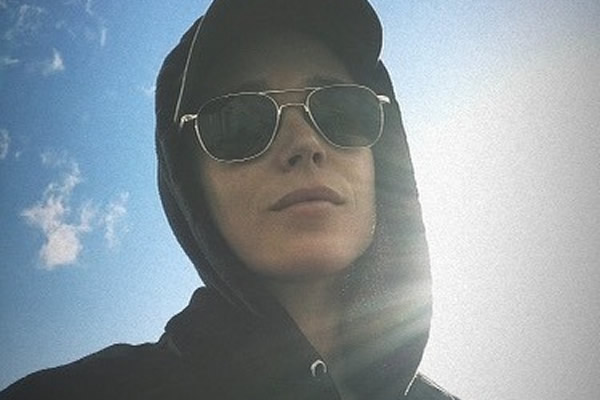
Elliot Page, a Canadian actor and producer known for roles in TV shows “Pit Pony,” “Trailer Park Boys,” “ReGenesis” as well as the 2005 film “Hard Candy,” came out as transgender last month.
He’d come out as a gay woman in February 2014. Page was nominated for an Oscar in 2008 for his role in “Juno” and is also the star of Netflix’s “The Umbrella Academy.”
“Hi friends, I want to share with you that I am trans, my pronouns are he/they and my name is Elliot. I feel lucky to be writing this. To be here. To have arrived at this place in my life. I feel overwhelming gratitude for the incredible people who have supported me along this journey,” he wrote.
4: Queer streaming galore
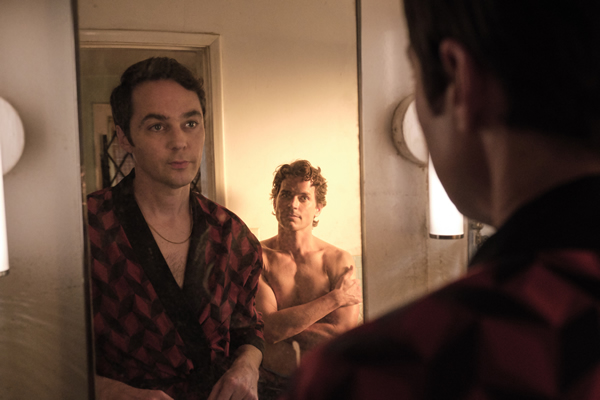
Movie theaters were closed but that only pushed the streaming rage further into the forefront of the entertainment ecosystem. And if there was any gay angle to it, there’s a good chance Ryan Murphy was involved.
The full cast of the 2018 Broadway debut of Mart Crowley (who died in March at age 84) classic “The Boys in the Band” reunited for a film version that debuted on Netflix in late September. The Blade called it a strong adaptation that “preserved in full” the “strength and dignity” of the source material. Murphy produced.
The seven-episode miniseries “Hollywood” debuted in March on Netflix with Patti LuPone helming this saga about a group of aspiring actors in filmmakers in post-WWII Tinseltown. Several gay characters and themes abounded including nods to Scotty Bowers and Rock Hudson among others. It drew mixed reviews but 12 Emmy nominations. Janet Mock directed two episodes. Murphy directed just one but was creator, executive producer, and writer.
And in December came “The Prom,” a Murphy-directed musical comedy based on the 2018 Broadway musical with Meryl Streep, James Corden and Nicole Kidman about Broadway actors who head to Indiana to fight a ruling that a high school prom is being cancelled because one female student wanted to take a girl as her date. Chaos ensues.
The Blade called it a “frothy mix that exists on the thin line between camp and hokum.”
And one you may have missed (again, with Murphy involvement) is “A Secret Love,” a documentary about Terry Donahue and her partner Pat Henschel who finally go public and get married after keeping their relationship a secret from their families for six decades.
3: Epic catfight

And then, of course, we had “Tiger King,” one of the increasingly rare shows that became a true cultural phenom.
The outrageous, seven-episode Netflix docuseries tells of zookeeper Joe Exotic (who sports a peroxide mullet) and his feud with Carole Baskin who accuses him of abusing and exploiting wild animals. Watched by 34.3 million people over its first 10 days of release, it’s been called “one of” Netflix’s most successful releases ever.
Adding to the color is Exotic’s unofficial same-sex throuplehood with Travis Maldonado and John Finlay and his relationship with future husband Dillon Passage.
He’s currently serving a 22-year prison sentence for, among other things, planning to have Baskin killed.
2: Cancel Ellen!
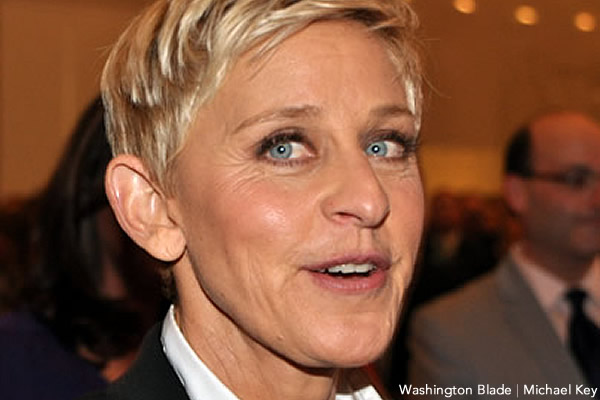
“The Ellen DeGeneres Show” was the subject of an internal third-party investigation by Warner Media after reports that the long-running hit daytime talk show was a toxic workplace behind the scenes.
In the spring, Variety reported on alleged mistreatment of long-time crew members and in July BuzzFeed published a report alleging racism and intimidation.
After delaying her 18th-season opener, DeGeneres, 62, addressed the situation in her opening monologue on Sept. 21. “I learned that things happened here that never should have happened,” she said. “I take that very seriously and I want to say I am sorry to the people who were affected.”
She acknowledged being in a “position of privilege and power.” People magazine, citing an unnamed source, said her perfectionist tendencies “ can be difficult. … She is looking at herself to make changes.”
She vowed to “start a new chapter” with the show’s 270 employees, People reports.
Following the internal investigation, in August DeGeneres apologized to her employees via video conference and confirmed that three top producers were leaving the show. The crew applauded.
DeGeneres said in December she would be back after the holidays after testing positive for COVID-19.
1: COVID disrupts
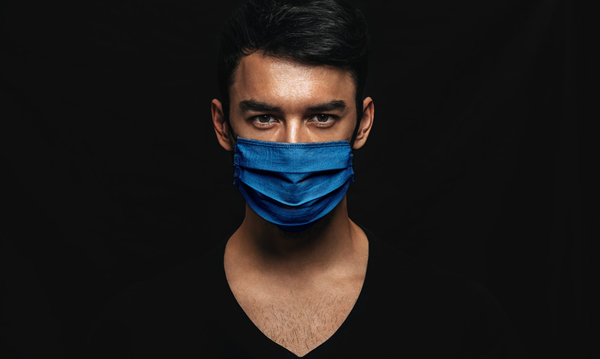
There wasn’t a single facet of the entertainment industry spared the disruptions related to COVID-19 pandemic restrictions from drag queens to touring musicians to theater producers and performers to the entire movie and TV industry, which soon ran out of “in the can” content to air or stream.
Although the competition part of “RuPaul’s Drag Race” season 12 was already taped and airing, the reunion and finale were taped — and cleverly edited — via Zoom.
Queer artists as diverse as Billy Gilman, Melissa Etheridge and the Indigo Girls offered living room concerts. Some were free, others moved to a subscription model.
With movie theaters closed for much of the year, release dates were bumped. Box office revenue reached lows not seen in 20 years and Cineworld, the world’s second-largest chain, closed in October. Many films that had planned theatrical releases were streamed instead and the bodies that govern the Golden Globes and the Oscars have made eligibility allowances. Perhaps the most prominent film to be postponed was “Wonder Woman 1984,” which will stream Dec. 25 on HBO Max, the same day it hits theaters in a move that has outraged some in the industry.
Some production units formed set bubbles in which cast and crew, subject to daily temperature checks and frequent COVID tests, quarantine from the outside world during shooting.
Resuming was a necessity and not just so people have stuff to watch coming through the pipeline. Colleen Bell, executive director of the California Film Commission, told NBC News the industry supports 700,000 jobs in California alone that accounts for $16 billion in wages.
a&e features
Doug Spearman takes his chance
‘Noah’s Arc: The Movie’ debuted on Paramount+ last month

There’s no question that when Patrik-Ian Polk’s series “Noah’s Arc” premiered on Logo 20 years ago, it was a groundbreaking creation. The story of a group of Black gay men and their wonderful friendship. The titular arc was that of the cute main character, Noah (Darryl Stephens), and his close-knit circle of friends, including Chance played by gay actor Doug Spearman. This compelling and loving fraternity may, in fact, be what brought viewers back repeatedly, including a 2008 movie, “Noah’s Arc: Jumping the Broom,” as well as the 2020 “Noah’s Arc” short, and now, a new full-length feature “Noah’s Arc: The Movie,” debuting on Paramount+ on June 20. In the movie, filled with equal measures of laughs and tears, Chance, who has faced a devastating loss, finds his dependable friends there, ready to support and comfort him at a moment’s notice. I had the pleasure of speaking with Spearman the morning of the streaming premiere of “Noah’s Arc: The Movie.”
WASHINGTON BLADE: Doug, since the early 2000s, when the “Noah’s Arc” series premiered on Logo, you have been playing the character of Chance, including in the latest installment, “Noah’s Arc: The Movie.” What was it about Chance that appealed to you as an actor?
SPEARMAN: When Patrik (-Ian Polk) called me to ask me to play him (Chance), I was at JFK airport in the baggage claim, waiting for a suitcase. He explained what the part was. The thing that stuck out to me was the fact that Chance was in a long-term relationship with another Black man. And, they had a child; they had a 4-year-old daughter named Kenya. I had never seen two Black gay men raise a child on TV before. I thought it was the most revolutionary thing I’d ever seen. I immediately thought I’ve got to do this because that was something nobody had seen. I thought it was incredibly important to take the part.
BLADE: “Noah’s Arc: The Movie” was, once again, written and directed by Patrik-Ian Polk, who you just mentioned, is the creator of the entire franchise. What’s the secret to your long-standing working relationship?
SPEARMAN: [Laughs] the whole team, all of us, are like a band of brothers. We fight like brothers, we come together like brothers, we hash things out, we talk, because we’re all very different from our characters. I think the challenge of playing these guys and then uplifting these men, playing a part, especially something written by Patrik, is like solving a math equation. There’s always a challenge that’s enjoyable for me as an actor: to try to find out what it is that Patrik wants, and then how do I do it.
BLADE: I think you do a very good job of it.
SPEARMAN: Thank you very much
BLADE: In the years between “Jumping the Broom” and the new full-length movie, many changes have occurred, and the story addresses some of them, including gay widowhood, which is something that the aging community is now confronting, as well as mental health issues. Please say a few words about how you approached those subjects in the new movie.
SPEARMAN: I had a lot of loss in my life, right before we started shooting. Two months before we started shooting the first series, my mother died. I was going through the grief process through that whole first season. Since then, I’ve lost a lot of people in my life. In fact, when we started shooting the second season, the second week we were shooting, my ex died of a heart attack. I was having to fold that into what I was doing with my life on the set and off the set. You’ve got to show up and you’ve got to do your work. The first two seasons of “Noah’s Arc” are always tinged with the memory of grief. So, when I had to deal with the death that Chance faces (in the new movie), which is a significant death in his life, it wasn’t that hard to reach back, especially the scene in the graveyard. It was something that I unfortunately could pull from personal experience.
BLADE: Shifting gears, the movie features delightful cast surprises, including Jasmine Guy and TS Madison. Did you have a chance to interact with either or both when they were on set?
SPEARMAN: No, I didn’t have any scenes with Jasmine, and I missed her. I wish I had gotten to see her because I actually got to direct Jasmine for a CBS promo shoot for “Queen,” back in the early ‘90s. I had a huge crush on her when she was on “A Different World.” So, I really would have liked to reconnect. But TS and I got to see each other every day because I was in all her scenes. It was extraordinary being around somebody like that. That is one outspoken woman!
BLADE: Even though Beyoncé never makes an appearance in the movie, there’s a lot of talk about her. Would you say you are a Beyoncé fan?
SPEARMAN: Yes! I’m breathing! Yes, I’m a Beyoncé fan. I actually got the chance to meet her. I knew her mom. Her mom was extraordinary to me. She is in the second movie I directed. She also gave us a wedding gown to use in the very first scene of the movie. That family is extraordinarily important to me. Not only just to be a fan, but to be somebody who’s gotten to know them and work with them and see how hard they work. I don’t think anybody works as hard as Tina or Beyoncé.
BLADE: There was a recent news item about gay actor Benito Skinner of the Amazon Prime series “Overcompensating” being told not to bother auditioning for straight roles. As an out actor yourself, how important do you think it is for queer characters to be portrayed by queer actors, and vice versa?
SPEARMAN: Being queer is a multifaceted identity. There’s no one kind of queer person. I think finding the best actor that’s your first circle of casting. I think one of the joys about being an actor is that you get to play different parts. I play straight guys all the time. Dads and husbands and things like that. I think a lot of people are told not to do it. In fact, I wouldn’t be Chance if the actor who was originally cast as Chance hadn’t been pulled out of the series by his agents because they didn’t want him to play a gay character.
BLADE: That’s amazing! Thank you for sharing that. Without giving away too much, the ending of the movie is a little ambiguous, even ending with a question mark. If there was a “Noah’s Arc: The Movie” sequel, would you come back for that?
SPEARMAN: Yeah! A lot of it would depend on what Chance’s journey is going to be like. Patrik and I have conversations like that all the time. He’s very interested and supportive of input. I hope I would be, as we all would be, part of the creative growth with these characters. They live in Patrik’s head, and he writes them, but we’re the ones who have to flesh them out. It’s a conversation, it’s always a conversation.
BLADE: You are currently performing in Molière’s “The Imaginary Invalid” as part of the New Orleans Shakespeare Festival at Tulane. What has this experience been like for you?
SPEARMAN: It’s extraordinary! I started on stage when I was seven. There’s nothing like working with a live audience and having that immediacy. I’m working with an extraordinarily talented cast in a really great play, and I have some of the best scene partners I could ever want.
BLADE: Are there any upcoming film or TV projects you’d like to mention?
SPEARMAN: I’m still a writer, and I’m still a director, and I’ve still got scripts that I would like to make. I have a little something that’s a cross between “Treme” and “Bridgerton” that I want to do. I’m always trying to figure out what the next thing is.
a&e features
Visit Cambridge, a ‘beautiful secret’ on Maryland’s Eastern Shore
New organization promotes town’s welcoming vibe, LGBTQ inclusion

CAMBRIDGE, Md. — Driving through this scenic, historic town on Maryland’s Eastern Shore, you’ll be charmed by streets lined with unique shops, restaurants, and beautifully restored Victorian homes. You’ll also be struck by the number of LGBTQ Pride flags flying throughout the town.
The flags are a reassuring signal that everyone is welcome here, despite the town’s location in ruby red Dorchester County, which voted for Donald Trump over Kamala Harris by a lopsided margin. But don’t let that deter you from visiting. A new organization, Proudly Cambridge, is holding its debut Pride event this weekend, touting the town’s welcoming, inclusive culture.
“We stumbled on a beautiful secret and we wanted to help get the word out,” said James Lumalcuri of the effort to create Proudly Cambridge.
The organization celebrates diversity, enhances public spaces, and seeks to uplift all that Cambridge has to share, according to its mission statement, under the tagline “You Belong Here.”
The group has so far held informal movie nights and a picnic and garden party; the launch party is June 28 at the Cambridge Yacht Club, which will feature a Pride celebration and tea dance. The event’s 75 tickets sold out quickly and proceeds benefit DoCo Pride.
“Tickets went faster than we imagined and we’re bummed we can’t welcome everyone who wanted to come,” Lumalcuri said, adding that organizers plan to make “Cheers on the Choptank” an annual event with added capacity next year.
One of the group’s first projects was to distribute free Pride flags to anyone who requested one and the result is a visually striking display of a large number of flags flying all over town. Up next: Proudly Cambridge plans to roll out a program offering affirming businesses rainbow crab stickers to show their inclusiveness and LGBTQ support. The group also wants to engage with potential visitors and homebuyers.
“We want to spread the word outside of Cambridge — in D.C. and Baltimore — who don’t know about Cambridge,” Lumalcuri said. “We want them to come and know we are a safe haven. You can exist here and feel comfortable and supported by neighbors in a way that we didn’t anticipate when we moved here.”

Lumalcuri, 53, a federal government employee, and his husband, Lou Cardenas, 62, a Realtor, purchased a Victorian house in Cambridge in 2021 and embarked on an extensive renovation. The couple also owns a home in Adams Morgan in D.C.
“We saw the opportunity here and wanted to share it with others,” Cardenas said. “There’s lots of housing inventory in the $300-400,000 range … we’re not here to gentrify people out of town because a lot of these homes are just empty and need to be fixed up and we’re happy to be a part of that.”
Lumalcuri was talking with friends one Sunday last year at the gazebo (affectionately known as the “gayzebo” by locals) at the Yacht Club and the idea for Proudly Cambridge was born. The founding board members are Lumalcuri, Corey van Vlymen, Brian Orjuela, Lauren Mross, and Caleb Holland. The group is currently working toward forming a 501(c)3.
“We need visibility and support for those who need it,” Mross said. “We started making lists of what we wanted to do and the five of us ran with it. We started meeting weekly and solidified what we wanted to do.”
Mross, 50, a brand strategist and web designer, moved to Cambridge from Atlanta with her wife three years ago. They knew they wanted to be near the water and farther north and began researching their options when they discovered Cambridge.
“I had not heard of Cambridge but the location seemed perfect,” she said. “I pointed on a map and said this is where we’re going to move.”
The couple packed up, bought a camper trailer and parked it in different campsites but kept coming back to Cambridge.
“I didn’t know how right it was until we moved here,” she said. “It’s the most welcoming place … there’s an energy vortex here – how did so many cool, progressive people end up in one place?”
Corey van Vlymen and his husband live in D.C. and were looking for a second home. They considered Lost River, W.Va., but decided they preferred to be on the water.
“We looked at a map on both sides of the bay and came to Cambridge on a Saturday and bought a house that day,” said van Vlymen, 39, a senior scientist at Booz Allen Hamilton. They’ve owned in Cambridge for two years.
They were drawn to Cambridge due to its location on the water, the affordable housing inventory, and its proximity to D.C.; it’s about an hour and 20 minutes away.
Now, through the work of Proudly Cambridge, they hope to highlight the town’s many attributes to residents and visitors alike.
“Something we all agree on is there’s a perception problem for Cambridge and a lack of awareness,” van Vlymen said. “If you tell someone you’re going to Cambridge, chances are they think, ‘England or Massachusetts?’”
He cited the affordability and the opportunity to save older, historic homes as a big draw for buyers.
“It’s all about celebrating all the things that make Cambridge great,” Mross added. “Our monthly social events are joyful and celebratory.” A recent game night drew about 70 people.
She noted that the goal is not to gentrify the town and push longtime residents out, but to uplift all the people who are already there while welcoming new visitors and future residents.
They also noted that Proudly Cambridge does not seek to supplant existing Pride-focused organizations. Dorchester County Pride organizes countywide Pride events and Delmarva Pride was held in nearby Easton two weeks ago.
“We celebrate all diversity but are gay powered and gay led,” Mross noted.
To learn more about Proudly Cambridge, visit the group on Facebook and Instagram.
What to see and do
Cambridge, located 13 miles up the Choptank River from the Chesapeake Bay, has a population of roughly 15,000. It was settled in 1684 and named for the English university town in 1686. It is home to the Harriet Tubman Museum, mural, and monument. Its proximity to the Blackwater National Wildlife Refuge makes it a popular stop for birders, drawn to more than 27,000 acres of marshland dubbed “the Everglades of the north.”
The refuge is walkable, bikeable, and driveable, making it an accessible attraction for all. There are kayaking and biking tours through Blackwater Adventures (blackwateradventuresmd.com).
Back in town, take a stroll along the water and through historic downtown and admire the architecture. Take in the striking Harriet Tubman mural (424 Race St.). Shop in the many local boutiques, and don’t miss the gay-owned Shorelife Home and Gifts (421 Race St.), filled with stylish coastal décor items.
Stop for breakfast or lunch at Black Water Bakery (429 Race St.), which offers a full compliment of coffee drinks along with a build-your-own mimosa bar and a full menu of creative cocktails.
The Cambridge Yacht Club (1 Mill St.) is always bustling but you need to be a member to get in. Snapper’s on the water is temporarily closed for renovations. RaR Brewing (rarbrewing.com) is popular for craft beers served in an 80-year-old former pool hall and bowling alley. The menu offers burgers, wings, and other bar fare.
For dinner or wine, don’t miss the fantastic Vintage 414 (414 Race St.), which offers lunch, dinner, wine tasting events, specialty foods, and a large selection of wines. The homemade cheddar crackers, inventive flatbreads, and creative desserts (citrus olive oil cake, carrot cake trifle) were a hit on a recent visit.
Also nearby is Ava’s (305 High St.), a regional chain offering outstanding Italian dishes, pizzas, and more.
For something off the beaten path, visit Emily’s Produce (22143 Church Creek Rd.) for its nursery, produce, and prepared meals.
“Ten minutes into the sticks there’s a place called Emily’s Produce, where you can pay $5 and walk through a field and pick sunflowers, blueberries, you can feed the goats … and they have great food,” van Vlymen said.
As for accommodations, there’s the Hyatt Regency Chesapeake Bay (100 Heron Blvd. at Route 50), a resort complex with golf course, spa, and marina. Otherwise, check out Airbnb and VRBO for short-term rentals closer to downtown.
Its proximity to D.C. and Baltimore makes Cambridge an ideal weekend getaway. The large LGBTQ population is welcoming and they are happy to talk up their town and show you around.
“There’s a closeness among the neighbors that I wasn’t feeling in D.C.,” Lumalcuri said. “We look after each other.”
a&e features
James Baldwin bio shows how much of his life is revealed in his work
‘A Love Story’ is first major book on acclaimed author’s life in 30 years

‘Baldwin: A Love Story’
By Nicholas Boggs
c.2025, FSG
$35/704 pages
“Baldwin: A Love Story” is a sympathetic biography, the first major one in 30 years, of acclaimed Black gay writer James Baldwin. Drawing on Baldwin’s fiction, essays, and letters, Nicolas Boggs, a white writer who rediscovered and co-edited a new edition of a long-lost Baldwin book, explores Baldwin’s life and work through focusing on his lovers, mentors, and inspirations.
The book begins with a quick look at Baldwin’s childhood in Harlem, and his difficult relationship with his religious, angry stepfather. Baldwin’s experience with Orilla Miller, a white teacher who encouraged the boy’s writing and took him to plays and movies, even against his father’s wishes, helped shape his life and tempered his feelings toward white people. When Baldwin later joined a church and became a child preacher, though, he felt conflicted between academic success and religious demands, even denouncing Miller at one point. In a fascinating late essay, Baldwin also described his teenage sexual relationship with a mobster, who showed him off in public.
Baldwin’s romantic life was complicated, as he preferred men who were not outwardly gay. Indeed, many would marry women and have children while also involved with Baldwin. Still, they would often remain friends and enabled Baldwin’s work. Lucien Happersberger, who met Baldwin while both were living in Paris, sent him to a Swiss village, where he wrote his first novel, “Go Tell It on the Mountain,” as well as an essay, “Stranger in the Village,” about the oddness of being the first Black person many villagers had ever seen. Baldwin met Turkish actor Engin Cezzar in New York at the Actors’ Studio; Baldwin later spent time in Istanbul with Cezzar and his wife, finishing “Another Country” and directing a controversial play about Turkish prisoners that depicted sexuality and gender.
Baldwin collaborated with French artist Yoran Cazac on a children’s book, which later vanished. Boggs writes of his excitement about coming across this book while a student at Yale and how he later interviewed Cazac and his wife while also republishing the book. Baldwin also had many tumultuous sexual relationships with young men whom he tried to mentor and shape, most of which led to drama and despair.
The book carefully examines Baldwin’s development as a writer. “Go Tell It on the Mountain” draws heavily on his early life, giving subtle signs of the main character John’s sexuality, while “Giovanni’s Room” bravely and openly shows a homosexual relationship, highly controversial at the time. “If Beale Street Could Talk” features a woman as its main character and narrator, the first time Baldwin wrote fully through a woman’s perspective. His essays feel deeply personal, even if they do not reveal everything; Lucian is the unnamed visiting friend in one who the police briefly detained along with Baldwin. He found New York too distracting to write, spending his time there with friends and family or on business. He was close friends with modernist painter Beauford Delaney, also gay, who helped Baldwin see that a Black man could thrive as an artist. Delaney would later move to France, staying near Baldwin’s home.
An epilogue has Boggs writing about encountering Baldwin’s work as one of the few white students in a majority-Black school. It helpfully reminds us that Baldwin connects to all who feel different, no matter their race, sexuality, gender, or class. A well-written, easy-flowing biography, with many excerpts from Baldwin’s writing, it shows how much of his life is revealed in his work. Let’s hope it encourages reading the work, either again or for the first time.
-

 Sports5 days ago
Sports5 days agoTrans cyclist’s victory sparks outrage in conservative media
-

 Israel5 days ago
Israel5 days agoActivist recalls experience in Tel Aviv after Israel-Iran war began
-

 Movies4 days ago
Movies4 days agoTwo new documentaries highlight trans history
-

 Real Estate4 days ago
Real Estate4 days agoCelebrate the power of homeownership this Fourth of July

